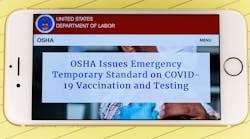It’s not a secret that warehouse workers have it rough. The work is often unsafe, and the hours are not ideal.
While there is a realization that benefits offered to warehouse workers are not always the same as their colleagues who work elsewhere in the facility, many people were shocked when COVID-19 exposed the conditions under which these essential workers functioned.
Protection needed to keep the virus at bay were often not in place. PPE supplies were short, and measures taken elsewhere were often not adhered to in warehouses.
Even industry veterans were shocked. Tim Bray, a vice president and veteran engineer with Amazon’s cloud-computing division, was so upset he quit his job. And he didn’t go quietly either.
In his resignation letter (which he made public), Bray wrote, “Stories surfaced of unrest in Amazon warehouses, workers raising alarms about being uninformed, unprotected and frightened. Official statements claimed every possible safety precaution was being taken. Then a worker organizing for better safety conditions was fired…. Firing whistleblowers isn’t just a side-effect of macroeconomic forces, nor is it intrinsic to the function of free markets. It’s evidence of a vein of toxicity running through the company culture. I choose neither to serve nor drink that poison.”
Bray’s outrage was joined by fellow white-collar workers at Amazon who are trying to organize on behalf of the warehouse workers in an effort to ensure that they are afforded the same protection and benefits given to white-collar workers.
And it’s not just Amazon that’s under fire. Warehouse workers as well as retail workers at Instacart, Shipt, Target and Whole Foods staged protests in May to highlight inadequate responses to COVID-19.
And these workers have good reason to protest, according to the Shift Project, a joint project of UC Berkeley and UCSF. The project’s study, conducted in March and April, found that only 41% of warehouse workers reported new workplace cleaning procedures.
Looking at big-box stores, warehouse and fulfillment centers, some did better than others. “Costco and Home Depot stand out, and Walmart, Amazon and UPS lag in terms of cleaning, gloves and masks,” the report says. “Yet, even as there is variation across firms, requirements to wear masks never exceed one-third of workers.”
In addition to these physical protections, general workplace policies often are missing.
“Protections including access to extended paid leave should a worker be impacted by COVID-19, access to healthcare, workers’ compensation, unemployment insurance, and overtime are often overlooked and now more important than ever,” says Steve Avalone, CEO of Bluecrew, a company that provides temporary warehouse workers, and others temporary workers, with employment protection.
So where is OSHA in all of this? “Aided and abetted by OSHA, which is all but absent these days, employers have needlessly exposed workers to COVID-19,” said Rebecca Dixon, executive director of the National Employment Law Project, during a Senate Judiciary Committee hearing on May 12.
However, policy makers are trying to address this issue. On May 13, Senator Elizabeth Warren (D-MA) and Representative Ro Khanna (D-CA) called for an Essential Workers Bill of Rights. Some protections they are advocating for include:
● Employees should have necessary amounts of personal protective equipment provided by employers at no cost to the employee.
● Essential workers should be paid a livable wage during the pandemic as well as a robust premium.
● Workers should be covered under the PAID Leave Act, which provides 14 days of paid sick leave and 12 weeks of paid family and medical leave.
● Misclassifying workers as independent contractors in order to avoid providing the full suite of benefits and protections available to employees must end.
● All essential workers should get the care they need during this crisis, including those who are uninsured or under-insured, regardless of their immigration status.
Fundamental employment rights need to be equal for all employees, regardless of where they work. What has been accepted as standard procedure for warehouse workers has to change. As essential workers who must continue working during this pandemic, they should be afforded more protection, not less.
Note: MHL heard from Timothy Carter, an Amazon spokeman who made the following comment on the article.
"Nothing is more important than the safety of our teams. We have redeployed a large number of our data scientists, technologists, and operations employees to focus on COVID-19 and ensure the safety of our workforce, including thousands of individuals on our health and safety teams. An in-depth analysis of sites is one of many tools that help us evaluate the full picture in our buildings related to COVID-19. In addition to a deep dive by a site, other tools include social distancing audits and having an epidemiologist review available data to ensure our safety measures are effectively protecting workers from exposure to COVID-19 in the workplace.



